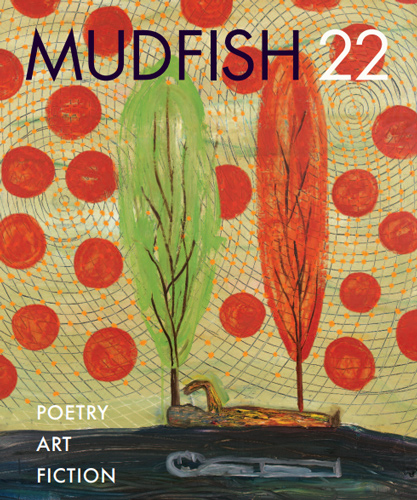Mudfish – 2017
With no offense to anyone, it is refreshing to review a multi-genre collection coming from outside a university. That doesn’t make the contributors any better or worse from either source, but it does provide an added perspective. As a group, the contributors to Mudfish 19, are not aspiring student writers; they are practiced artists providing us with practiced skills that encourage thoughtful reading and reflection. The independence of a private press also gives us a much larger selection of authors, painters, and photographers than we can hope for in any one issue of a university press.
With no offense to anyone, it is refreshing to review a multi-genre collection coming from outside a university. That doesn’t make the contributors any better or worse from either source, but it does provide an added perspective. As a group, the contributors to Mudfish 19, are not aspiring student writers; they are practiced artists providing us with practiced skills that encourage thoughtful reading and reflection. The independence of a private press also gives us a much larger selection of authors, painters, and photographers than we can hope for in any one issue of a university press.
The poets share with us experiences that the experienced and mature can identify with and reflect on.
Steven M. Smith’s “Deserter” tells of the battles of a young boy with an abusive father: “The sites of his fist now pointed at me. / His beer bottle exploded on the linoleum, / And I caught shrapnel in the shin.”
Sandy Longley’s “Derma Blues” vividly describes one of the agonies of aging using rich language:
Mine, on the other hand, is
bruised, burned, Botoxed-
rosacea stippling my facial canvas,
cellulite cratering each thigh,
a bleedinghearttatto
humiliating my left humerus.
Kevin Arnold helps us see a lifestyle through father’s eyes, and successfully sets the scene of “a theater bar on a rainy day in New York City” for readers, in “Across the Decades”:
[ . . . ] It has been
eleven years since he came out to me, and eleven years
longer since I asked his nursery school teachers if
he might already be in a club I could never join.
Jesse Back’s “I Get Older” invites us to identify with life’s experiences. The piece explores the ways in which we also grow wiser with age and experience:
I get older
and it all becomes
less harsh.Relationships
a decade old
are blunted by time.Instead of asking
‘How could she do that?’
I say
‘I see how she could do that.’
The artwork: Eighty-four poets offer us a sampling of their work and invite us to search further for their collections. The paintings and photographs, on the other hand, invite us to view the artwork, available in full color online. Even if my words don’t ‘entice’ you to view the 40 pieces enclosed in these pages, and even if you don’t have an opportunity to purchase the journal, it would be well-worth your time to visit the website.
There are only eight short prose pieces in this issue, but the quality makes up for our hope of even more in the future. Such writers as Jennifer Belle, Aaron Zimmerman, Alice Jurish, and Jill Hoffman provide reflective pieces that take us back to our youth, our relationships, and our lessons in life and emotions. These pieces add a fine touch to a fine collection of artistic work.
[www.mudfish.org]





